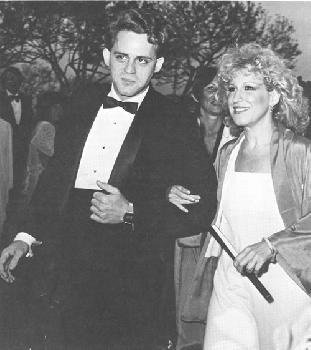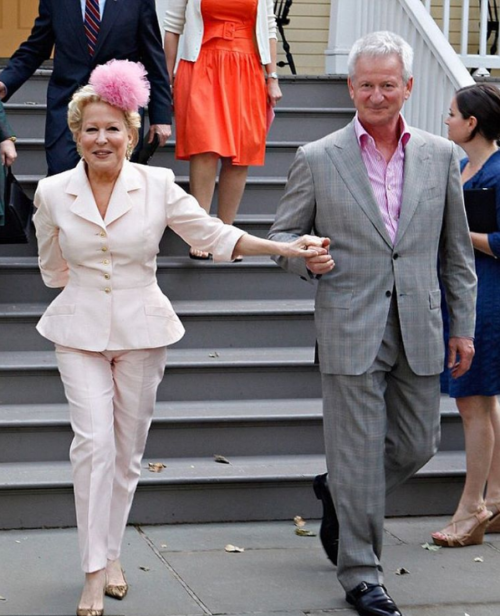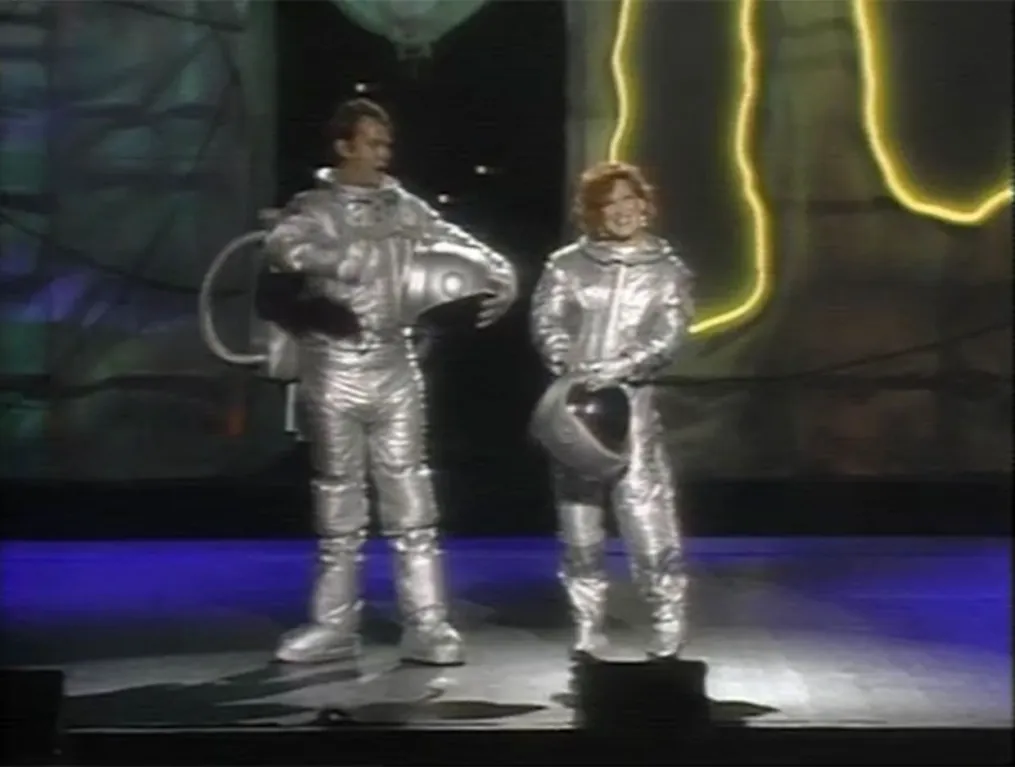Mister D: Bette actually was escorted to the Oscar’s by musician Chaz Sanford…I have a picture of their arrival further down….the picture with Peter Riegert was taken at the 1979 New York premiere of “The Rose” (November 6. 1979)
25 Years Ago: Yuks by Johnny, a Field day, and a future Focker– recalling 1980’s Oscar night.(Oscar Guide 2005)
Entertainment Weekly; 2/4/2005; Wulf, Steve
Byline: Steve Wulf
Photo: Bette and Peter Riegert
THE 52ND ACADEMY AWARDS WAS ONE FOR THE AGES. FOR INstance, 8-year-old Justin Henry (Kramer vs. Kramer) was up against 79-year-old Melvyn Douglas (Being There) and 59-year-old MickeyRooney(The Black Stallion), a former child star himself, in the Best Supporting Actor category. An 18-year-old, Mariel Hemingway, was nominated for Best Supporting Actress for her performance as Woody Allen’s lover in Manhattan. The former Gidget, Sally Field, was among the Best Actress nominees for her role in Norma Rae. The generation gap that had colored the ’70s seemed to be playing itself out in the last year of the decade, and at the Dorothy Chandler Pavilion no less.
In retrospect, 1979 was a truly memorable year for the movies. Besides Manhattan and Being There, it saw the opening of such fresh and lasting films as Apocalypse Now, All That Jazz, Alien, The China Syndrome, Breaking Away, La Cage aux Folles, The Warriors, The Marriage of Maria Braun, Wise Blood, Monty Python’s Life of Brian, North Dallas Forty, and The Jerk. Unfortunately, Hollywood didn’t know what it had at the time–all those movies produced a grand total of eight Oscars, and only one in the six major categories. The big winner, with five statuettes, was the sentimental Kramer vs. Kramer, signaling a retreat by the industry into safer, friendlier fare. Either that, or Hollywood was recognizing the importance of Kramer’s box office receipts ($106.3 million, back when tickets were $2.50) on the eve of Income Tax Day.
DUSTIN DOINGS
Who better to welcome back into Oscar’s embrace than Dustin Hoffman, who had famously savaged the awards in years past and had lost out as Best Actor three times before (The Graduate, Midnight Cowboy, Lenny). Not only was he winning as workaholic-turned- superdad Ted Kramer in the weepie but he also poured on the charm plugging Kramer (and himself). He reportedly even accepted the Los Angeles Film Critics’ best-actor award on The Merv Griffin Show.
CARPET SWEEP
Hoffman arrived at the Oscars with his parents and his soon-to-be new bride, Lisa Gottsegen. Sally Field walked down the red carpet with comedian David Steinberg, having recently broken up with her boyfriend, Burt Reynolds, who could not bear the thought of going to the ceremony in a year when he was snubbed for Starting Over. Other celebrity couples: Best Actress nominee Jill Clayburgh (Starting Over) and playwright David Rabe; Best Actress nominee Marsha Mason (Chapter Two) and playwright Neil Simon; Best Actress nominee BetteMidler (The Rose) and actor Peter Riegert; and Best Director nominee BobFosse(All That Jazz) and actress Julie Hagerty. Bo Derek, the star of 10, showed up alone, without her Svengali-like husband, John Derek, because, she said, “It’s not his thing–he took Shirley Temple when he was 16. That was his first and last time.”
HERE’S JOHNNY–AGAIN!
Producer Howard Koch’s decision to tap The Tonight Show’s Johnny Carson (see page 12) as Oscar host was a no-brainer. Carson had wowed everybody in his first stint as emcee the year before, and he wasted no time in getting down to funny business this night. On Justin Henry: “He has the distinction of being the only Hollywood actor not in Britt Ekland’s memoirs.” On Bo Derek’s braids: “Forty years ago, Butterfly McQueen wore the same hairdo and nobody cared.” On Motion Picture Association of America president Jack Valenti: “He’s filled the charisma void left by the passing of Conrad Nagel.” But his best lines were ad-libbed after the winner of the Special Achievement Award for Sound Effects Editing, Alan Splet (The Black Stallion), failed to show. Said Carson, “First, George C. Scott doesn’t show, then Marlon Brando, and now Alan Splet.” Throughout the evening, Carson kept the audience apprised of Splet’s whereabouts in and around Los Angeles.
THAT’S ENTERTAINMENT?
If not for Carson, the show would’ve been a snoozefest–the theme was “The Elegant ’80s,” and the big number was a Donald O’Connor salute to movie choreography. There wasn’t a lot of star power in the cast of presenters, either, unless you really liked Robert Hays, Kristy McNichol, Persis Khambatta, Ben Vereen, Cloris Leachman, Douglas Fairbanks Jr., and Lauren Hutton. As for the nominated songs, what more can you say than that Melissa Manchester sang two of them? Okay, one of the others was sung by Kermit the Frog.
KRAMER VS. KRAMER, THE PREQUEL
The first major award of the evening, for Best Supporting Actress, went to Meryl Streep for Kramer vs. Kramer. Funny how these things work. This was neither Streep’s best nor most substantial (The Seduction of Joe Tynan) role that year. And Kate Jackson of Charlie’s Angels was originally supposed to play the other Kramer, while Streep was going to be the romantic interest played by JoBeth Williams. When they started filming, Streep was none too crazy about Hoffman. As she once recalled of their first meeting, “He came up to me and said, ‘I’m Dustin–burp–Hoffman,’ and he put his hand on my breast. What an obnoxious pig, I thought.” That night, though, she kissed Hoffman on the way up to the stage and thanked him profusely at the podium.
OLD SCHOOL
Walter Matthau and Liza Minnelli came out to present the Best Supporting Actor Oscar to…Melvyn Douglas. But the 79-year-old Douglas had boycotted the event because “the whole thing is so absurd, my competing with an 8-year-old.” Carson had a different take on Douglas’ absence: “He was in a car pool with Alan Splet.”
OBI WON
Hoffman presented an Honorary Oscar to Alec Guinness, who had actually won one for 1957’s The Bridge on the River Kwai. Hoffman said he had been spending weeks watching Sir Alec’s films, and when Guinness came up, he said, “Thank you, Mr. Hoffman, for your overgenerous words and all that deep research work you did…. I feel very fraudulent taking this, but, not letting any emotion pass over my face…I’m grabbing this while the going’s good.”
AUTEUR LIMITS
In an act of extraordinary bravery, Steven Spielberg came on stage with Goldie Hawn to present the Best Director Oscar–this after putting out his 1979 stinker, 1941. The winner was Robert Benton, who had talked producer Stanley Jaffe into letting him direct Kramer vs. Kramer and not just adapt the book. Then because Hoffman was unhappy with the script, the director spent months in rewrites with the actor. But Benton’s struggles were nothing compared to those of two of the losers in the category: Fosse, who bared his life for All That Jazz, and Francis Ford Coppola, who risked his for Apocalypse Now.
THE GRADUATE
Photo: Bette escorted to Oscars by Chaz Sanford
What must Jane Fonda have been thinking that night? Although she was nominated as Best Actress for The China Syndrome, she had turned down the title role in Norma Rae. She would know in a few minutes if she had made the right choice. In the meantime, she read the nominees for Best Actor: Hoffman, China Syndrome costar Jack Lemmon, Al Pacino for …And Justice for All, Roy Scheider for All That Jazz, and Peter Sellers for Being There.
To nobody’s surprise, Fonda called out Hoffman’s name, and he kissed his girlfriend, his mother, Justin Henry, Meryl Streep, and Jack Lemmon on his way to the stage. Looking at his first Oscar, he said, “He has no genitalia, and he’s holding a sword. I’d like to thank my parents for not practicing birth control. I’m up here with mixed feelings. I’ve been critical of the Academy, and for reason. I refuse to believe that I beat Jack Lemmon, that I beat Al Pacino, that I beat Peter Sellers.” After thanking all the people with whom he worked on the picture, Hoffman jerked a few more tears. “We are a part of an artistic family. There are 60,000 actors in the Screen Actors Guild, and most actors don’t work…. A few of us are so lucky to have the chance. And to that artistic family that strives for excellence, none of you have ever lost, and I am proud to share this with you, and I thank you.” (For more Hoffman, see page 62.)
EVERYBODY LOVES RAE
What must Richard Dreyfuss have been thinking that night? He had left the role Roy Scheider played in All That Jazz and was replaced by Michael Douglas in the part of the TV newsman in The China Syndrome. And now Fonda was among the nominees he was reading, along with Sally Field, Jill Clayburgh (who had also turned down Norma Rae), Bette Midler, and Marsha Mason. Opening the envelope, Dreyfuss tried to joke, “I’m not going to tell ya.” When he called out Sally Field’s name and she rushed to the stage, you had to wonder if she was shaking her fist at Dreyfuss or in triumph.
And what must Burt Reynolds have been thinking that night? Actually, he did reveal to a reporter what it was: “I sat home alone like a wounded Citizen Kane, visualizing [Field] dancing with Dustin Hoffman at the Academy ball. After that, nothing was the same.”
HOLY MOSES
There were four pictures–All That Jazz, Apocalypse Now, Breaking Away, Norma Rae–competing with Kramer vs. Kramer, but the result was preordained, and who better to deliver the news than Charlton Heston? After he called on Kramer vs. Kramer to enter the Promised Land of Oscar winners, the telecast broke up to the tune of “That’s Entertainment,” and the party moved next door for the Governors Ball. There, Meryl Streep temporarily misplaced her Oscar–in the ladies’ room. “How could I have done that?” she screamed.
Now, there’s a question a lot of the voters should’ve been asking.








